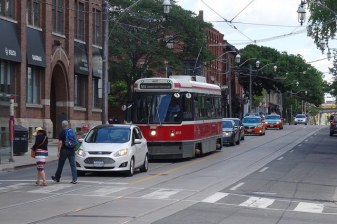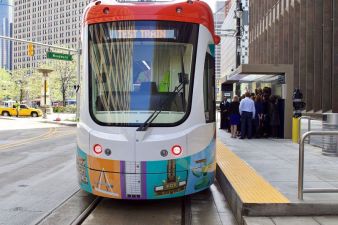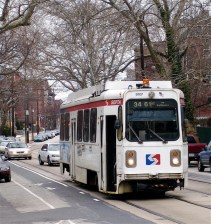All Aboard the Great Streetcar Debate
Streetcars provoke strong emotions in transpo geeks. A recent post on Human Transit called "Streetcars: An Inconvenient Truth" precipitated a very informed and sometimes heated thread of discussion on the relative virtues of light rail vs. bus rapid transit (a mode that got its moment in the limelight just this morning).
 Streetcars: Everybody’s got an opinion. Photo by adamscarroll via Flickr.
Streetcars: Everybody’s got an opinion. Photo by adamscarroll via Flickr.The Human Transit thread, which features several members of the Streetsblog Network, elucidates many of the most important arguments for each mode: cost of infrastructure;? access for wheelchairs, strollers and the like; speed; and perceived desirability as a chosen transport mode (that part is all about class). It’s a conversation well worth reading, and joining, for anyone interested in the topic.
Here’s what Jarrett Walker, the blog’s author, wrote in part:
I’m not saying that the bus will ever be a perfect replica of the streetcar. It won’t. But they key fact is that buses are not just improving, they’re improving in the direction of emulating rail.
This should suggest that the difference between bus and rail, as perceived by ordinary people who don’t know which features are intrinsic, is going to diminish over time, as it has been doing for the
past two decades. Doesn’t this suggest that while the short-term urban-development advantage of streetcars is undeniable, the long-term advantage may be much less? Big capital spending has to make sense for the long term.
Speed and reliability are eternal values; I’m quite confident that in 2050, people will still choose a faster service over a slower one. I’m not sure that in 2050, people will choose an electric vehicle on rails over an electric/hydrogen/whatever vehicle of the same size and shape, with many of the same characteristics, running on tires. Are you?
Head on over and join the debate if you will.
For network member UrbanReview STL, the issue is not streetcar vs. bus, but vintage reproduction streetcar vs. modern streetcar. Blog author Steve Patterson is concerned that the Loop Trolley route being proposed in St. Louis will be running old-timey replicas rather than up-to-date cars that allow for ease of boarding — and also send the message that this mode is not simply some quaint artifact, but a step into the future:
The Loop Trolley folks want that vintage look rather than providing the best transportation for the 21st Century. They are looking backward rather than forward.
They are looking at a system like they have in Little Rock AR. Little Rock’s vehicles are new but have a vintage look and feel. Filming a period movie? Great, use these. Investing tens of
millions in a modern transportation system that will last into the second half of the 21st Century? Wrong choice! The Loop Trolley folks are stuck in 1904. The World’s Fair is over, guys. So what is the
right choice?Modern “low-floor” vehicles such as the [ones] in Portland. The same type was used in Seattle. The vehicle’s low-floor center design with wide doors make entry/exit easy for everyone. Stroller & packages? No problem…
To make the reproduction cars accessible they’d have a ramp like our buses do. As a frequent wheelchair user I can tell you I would not use such a system. It works most of the time but it would set me apart from everyone else. The ramp would take time to extend & retract — holding up traffic in the meantime. Why not just build an accessible system with low-floor vehicles?
The trick is the modern low-floor vehicles cost roughly three times the price of a reproduction vehicle.
Other provocative items from around the network: Exquisite Struggle picks up on a mind-blowing story about a school system that forbids its students from coming to school by bike or foot, pointing out the ironies of trying to "protect" our children by moving them to suburban settings. (Bonus irony: the town in question is Saratoga Springs, home of anti-sprawl guru James Howard Kunstler.) Ecovelo decides to open up the always-contentious "vehicular cycling" debate. And The Transport Politic argues against using the promise of congestion reduction as a way of promoting transit.
Less controversial: Austin on Two Wheels features a really cool program that is using bikes to improve people’s lives in Kenya.


